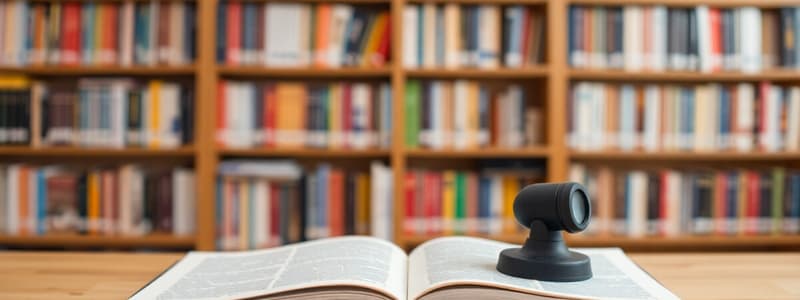Podcast
Questions and Answers
Which of the following is NOT a characteristic of media literacy?
Which of the following is NOT a characteristic of media literacy?
- The ability to create media in a variety of formats.
- The ability to access, analyze, and evaluate media in different forms.
- The ability to use media responsibly and ethically.
- The ability to understand the technical aspects of media production. (correct)
What is the key difference between information literacy and media literacy?
What is the key difference between information literacy and media literacy?
- Information literacy is broader than media literacy, including all types of information, whereas media literacy is focused solely on media like television and radio.
- Information literacy is about using technology, while media literacy is about understanding traditional media.
- They are both the same; there is no difference between information literacy and media literacy.
- Information literacy focuses on finding information, while media literacy is about understanding how that information is presented and consumed. (correct)
Which of the following is the BEST definition of information literacy?
Which of the following is the BEST definition of information literacy?
- Being able to understand and use different types of information. (correct)
- The ability to access information from the internet.
- The ability to use technology to create information.
- The ability to make informed decisions based on the information available.
According to the provided text, what is the role of technology in technology literacy?
According to the provided text, what is the role of technology in technology literacy?
Imagine a world without access to the internet, libraries, or cell phones. Which of the following would be MOST affected in this scenario?
Imagine a world without access to the internet, libraries, or cell phones. Which of the following would be MOST affected in this scenario?
Based on the provided context, what is the ultimate goal of media and information literacy?
Based on the provided context, what is the ultimate goal of media and information literacy?
Which of these would NOT be considered a form of 'media' based on the provided definition?
Which of these would NOT be considered a form of 'media' based on the provided definition?
Which of the following would NOT be considered a way to communicate news and events in a world without internet, libraries, phones, and traditional media?
Which of the following would NOT be considered a way to communicate news and events in a world without internet, libraries, phones, and traditional media?
Flashcards
Media Literacy
Media Literacy
The ability to access, analyze, evaluate, and create media in a variety of forms.
Information Literacy
Information Literacy
The ability to recognize when information is needed and to locate, evaluate, and effectively communicate it.
Technology Literacy
Technology Literacy
The ability to responsibly, appropriately, and effectively use technological tools to manage and communicate information.
Literacy
Literacy
Signup and view all the flashcards
Media
Media
Signup and view all the flashcards
Pure Information
Pure Information
Signup and view all the flashcards
The Role of Media in Life
The Role of Media in Life
Signup and view all the flashcards
Impact of No Media
Impact of No Media
Signup and view all the flashcards
Study Notes
Introduction to Media and Information Literacy
- Students are to reflect on media and information use from the past week
- Record hours spent interacting with different media sources
- Identify the media provider used the most
- Determine the roles media plays in student lives (e.g., leisure, learning, communication)
- Present findings to the class
Hypothetical Scenario
- Imagine a world without the internet, libraries, or cell phones
- Newspapers, magazines, radio stations, and TV channels also vanish
- Consider how information would be disseminated
- Reflect on methods of communication between people
- Consider strategies for sharing news and events
- Contemplate the impact on decision-making processes
- Evaluate the effects on daily life
Activity 2
- Assign one term from the following list to each group:
- Technology Literacy
- Media Literacy
- Information Literacy
- Media and Information Literacy
- Have each group formulate their own definition
- Present definitions to the class
Literacy Definitions
- Literacy: The ability to identify, understand, interpret, create, communicate, and compute using printed and written materials in various contexts.
- Media: Physical material (objects) used for communication (e.g., radio, television, computers, film)
- Media Literacy: The ability to access, analyze, evaluate, and create media in a range of forms
- Information: A broad term encompassing processed data, knowledge garnered from study, experience, instruction, signals, or symbols.
- Information Literacy: The capability to recognize when information is necessary, locate it, evaluate it, and communicate it effectively across diverse formats
- Technology Literacy: The ability of individuals, working independently or collaboratively, to responsibly, appropriately, and effectively use technology. This encompasses accessing, managing, integrating, evaluating, creating, and communicating information.
- Media and Information Literacy: The vital skills and knowledge essential for effectively engaging with diverse media and information providers. It fosters critical thinking and lifelong learning, empowering active citizens.
Studying That Suits You
Use AI to generate personalized quizzes and flashcards to suit your learning preferences.
Related Documents
Description
This quiz encourages students to reflect on their media and information usage over the past week, examining how different media sources influence their lives. Students will engage in activities that explore the role of media in communication, learning, and leisure, while also considering a hypothetical world without modern information technology. Through group discussions, students will define essential concepts in media literacy.




